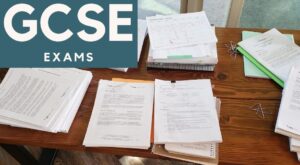What’s new in GCSE
Up to 2,500 secondary school students from between 60 and 100 schools will trial online GCSEs. Thousands of students in England will sit on-screen tests this year in a major pilot run by AQA, the country’s largest exam board, marking a big step towards online exams.
A second exam board, which is already running on-screen GCSE trials, has now said it is preparing to make high-stakes exams available on screen by 2025. According to polling for AQA, more than two-thirds (68%) of young people surveyed agreed digital exams would be better preparation for future work, education or training.
Earlier this year, the OCR exam board also piloted digital exams in UK schools.
What is GCSE
General Certificate of Secondary Education (GCSE) is an important part of the academic life of students in the United Kingdom. These exams determine a child’s future educational path, career choices, and university options. In this article, we will discuss what GCSE exams are and how to prepare for them.
Education system in the UK
General Certificate of Secondary Education (GCSE) – these are compulsory exams that students take in Year 11 in England.
Until Year 10, students in the UK schools study a fairly wide range of different subjects. Before the start of Year 10, students choose the subjects they will focus on over the next two years and in which to take GCSEs. While there is some flexibility in choosing subjects for GCSEs, three core subjects are compulsory: English, Maths and Science. The rest of the subjects students can choose in accordance with their interests and plans for pursuing further studying (A-Levels) and going to university. In total you need to choose about 8 subjects.
Passing GCSEs completes compulsory secondary education in England. Further education is not compulsory. If a student would like to continue his/her studying, he/she goes to Sixth Form to study A-Levels. The choice of subjects at this stage takes into account the requirements of the chosen university and the course.
Revision tips
1 Start by purchasing textbooks and revision guides for all the subjects. They can easily be purchased from Amazon or WHSmiths, if you prefer to see the books before you buy them.
2 You should start preparing for exams as early as possible.
3 Learn terminology. You need to know all the basic technical terms in each subject. To do this, you need to set aside several pages at the end of your notebook for a dictionary, and immediately write down terms and their definitions there each lesson. Preferably in your own words.
4 You need to learn how to structure exam answers properly.
The best way to do so is to practice lots of past papers. They are all available on exam boards’ websites in the public domain. Answers (marking schemes) are also available, and there are student answers with grades and examiner comments. The more often your child practices answering exam questions and checks his/her answers, the better she/he will do in exams.
5 Understanding the specific extent of revision required for your child is essential.
Each subject has a number of topics. The child knows some of them well, while others may seem more complex. It is important to be able to identify strengths and weaknesses in their revision process, as well as to have a bigger picture of the entire path to achieving the goal.
How can you make the revision process easier?
The most effective approach is to find a tutor as early as possible who can provide a revision plan and deliver structured and regular lessons.
We offer experienced tutors in all subjects. Our teachers are the graduates of the best universities in England, they have professional qualifications and undergo rigorous checks.
If you are looking for a tutor for your child, we will be happy to help. Please contact us for professional advice.
Email: info@beststarteducation.com
Tel. +44 79307 32407
Elena Colquhoun, MSc, PGCE, ACIL
Director of Best Start Education, qualified teacher and examiner
